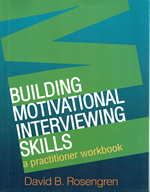6. Learning Motivational Interviewing
A Menu for Learning
MI is not a single technique but rather an integrated set of interviewing skills.
It is possible to think of specific learning tasks that correspond to component core skills of MI.
William R Miller and Stephen Rollnick in Motivational Interviewing, Helping People Change, Third Edition, The Guilford Pres 2013 think of at least 12 such tasks (numbered for ease of reference only):
A. Understanding the underlying spirit with which MI is practiced:
partnership, acceptance, compassion, and evocation (Chapter 2).B. Developing skill and comfort with reflective listening (Chapter 5) and
the client-centered OARS skills (Chapter 6).C. Identifying change goals toward which to move (Chapter 9).
D. Exchanging information and providing advice within an MI style (Chapter 11).
E. Being able to recognize change talk and sustain talk (Chapter 12).
F. Evoking change talk (Chapter 13).
G. Responding to change talk in a way that strengthens it (Chapter 14).
H. Responding to sustain talk and discord in a way that does not amplify it (Chapter 15).
I. Developing hope and confidence (Chapter 16).
J. Timing (Chapter 19) and negotiating a change plan (Chapter 20).
K. Strengthening commitment (Chapter 21).
L. Flexibly integrating MI with other clinical skills and practices (Chapter 25).
Miller and Rollnick continue:
We have not numbered these tasks because they are not necessarily learned in order. Clinicians may come to MI already with well-developed skills in some of these areas. Some component tasks can be learned apart from the others. For example, one might learn to identify change talk in a classroom or by reading. That is mostly a knowledge task, although it is far easier to recognize change talk on a transcript than within the fast-emerging flow of a clinical consultation.
Some component tasks are fundamental, and it is difficult to develop further skills until these are in place. Reflective listening is a good example. In the beginning, one struggles to remember to reflect and to come up with a good reflective listening statement rather than, say, asking a question. It feels effortful. With practice and the immediate feedback provided by the people with whom you converse, forming reflections becomes easier. Then with more practice and good results with clients, empathic listening begins to feel natural. It becomes the default response rather than asking questions or giving advice. You can always fall back to reflective listening, and at worst, you're unlikely to do harm. Then for some it becomes not only easy but a pleasure, a joy, a privilege. While, thankfully, one need not reach this level of proficiency in listening to begin doing MI, a certain level of comfort or naturalness with reflections is important.
Until one can comfortably follow a conversation with reflective listening it is difficult to take the next step to evoking, where one uses the OARS skills in a strategic manner to elicit and strengthen change talk.
Similarly, you need to have a change goal and be able to recognize change talk, to know it when you hear it, before you can evoke and respond differentially to it. A reasonable question to ask hen learning is, "What would be one good next step for me in developing and being comfortable with the clinical style of MI?"
A process for learning
One thing that is relatively clear at this point is that self-study or attending a single workshop is unlikely to improve competence.
Do you want your staff to know about MI or do you want them to actually be able to deliver it effectively?
Reading or a single workshop can increase knowledge of MI, but there is little reason to believe that it will instill skill. Worse, we know from firsthand experience that if we imply that participants will become skillful in MI through attending our workshop, they are likely to believe mistakenly that they have learned it. In a first evaluation of our own 2-day training workshop, participants showed very little improvement in skills, certainly not enough to make any difference in how their clients responded, but we did manage to significantly decrease their interest in learning more about MI (Miller & Mount, 2001).
Why? It was not because they didn't like MI or thought it was ineffective. It was because they believed they had already learned it.
William R Miller and Stephen Rollnick in Motivational Interviewing, Helping People Change, Third Edition, The Guilford Pres 2013 p 329
Website
This web site provides resources for those seeking information on Motivational Interviewing.
It is hosted by the Motivational Interviewing Network of Trainers (MINT), an international organization committed to promoting high-quality MI practice and training.
Training
Mental Health Coordinating Council
Books

Motivational Interviewing, Helping People Change,
William R Miller and Stephen Rollnick. Third Edition, The Guilford Press, 2013

Motivational Interviewing in Health Care
Stephen Rollnick, William R. Miller, Christopher C Butler.
Guildford Press, 2008.

Building Motivational Interviewing Skills, a practitioner workbook.
David B. Rosengren. Guildford Press. 2009
